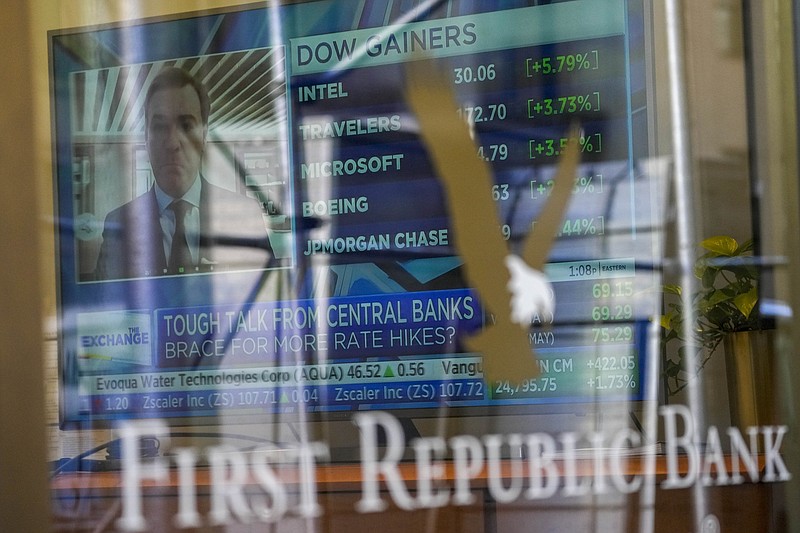By KEN SWEET
AP Business Writer
NEW YORK (AP) -- A group of Wall Street banks is planning a rescue package of around $30 billion for First Republic Bank, sources told The Associated Press on Thursday.
The rescue package comes as San Francisco-based First Republic has been battered by investors and worries have grown that the midsized bank might be the next to fail, after Silicon Valley Bank and Signature Bank.
Sources familiar with the matter said that JPMorgan Chase, Citigroup, Wells Fargo and Goldman Sachs are part of the group of banks pulling together the package. It is likely to consist of $30 billion in deposits and capital for First Republic.
The list of 11 banks involved also includes Truist, Morgan Stanley, BNY Mellon, State Street, US Bank, PNC and Bank of America, a source said.
The sources spoke on the condition of anonymity because the package was still being developed.
A First Republic spokesman declined to comment on the reports.
First Republic serves a similar clientele as Silicon Valley Bank, which failed Friday after depositors withdrew about $40 billion. Reports said First Republic also experienced a large number of withdrawals. Its shares dropped more than 60% Monday, even after the bank said it had secured additional funding from JPMorgan and the Federal Reserve.
Thursday the bank's shares were down as much as 36%, but rallied after reports the rescue package was in the works, and were up nearly 8% in afternoon trading.
The news comes after the collapse last week of Silicon Valley Bank, which was the second biggest bank failure in U.S. history after the demise of Washington Mutual in 2008.
The shuttering of Silicon Valley Bank Friday and of New York-based Signature Bank two days later has revived bad memories of the financial crisis that plunged the United States into the Great Recession of 2007-2009.
Over the weekend the federal government, determined to restore public confidence in the banking system, moved to protect all the banks' deposits, even those that exceeded the FDIC's $250,000 limit per individual account.
The deal came the same day Treasury Secretary Janet Yellen told the Senate Finance Committee that the nation's banking system "remains sound" and Americans "can feel confident" about their deposits.
Her remarks, coming against the backdrop of deepening concerns about the health of the global financial system, were an effort to signal to markets that there would be no broader contagion from the collapse of Silicon Valley Bank in California and Signature Bank in New York.
Facing fierce questioning by lawmakers on how Federal Reserve interest rates contributed to the bank failures and whether taxpayers would bear the brunt of the commitment to make depositors at the banks whole, Yellen stressed the need for the federal government to act to assure stability in the market.
"We certainly need to analyze carefully what happened to trigger these bank failures and examine our rules and supervision" to prevent failures from happening again, Yellen told the committee.
Yellen was the first Biden administration official to face lawmakers over the decision to protect uninsured money at two failed regional banks, a move that some have criticized as a bank "bailout."
The week has been a whirlwind for markets globally on worries about banks that may be bending under the weight of the fastest set of hikes to interest rates in decades. In Europe, troubles at Credit Suisse, Switzerland's second-largest lender this week prompted the Swiss central bank to agree to loan Credit Suisse up to 50 billion francs ($54 billion).
